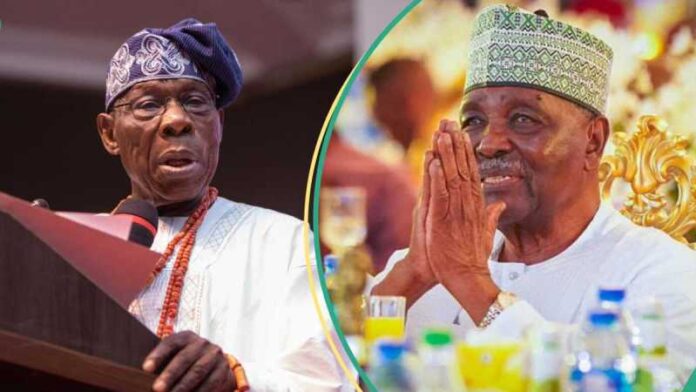Ochereome Nnanna
Over the weekend, something that brought smiles to my face showed on TV. Civil War Leader, General Yakubu Gowon(PhD) marked his 90th birthday in style. What added spice to the event was the appearance of General Olusegun Obasanjo(PhD) beside him. What a rare picture that was! Usually, Gowon and Obasanjo painstakingly avoid each other. The former thinks the latter is a stuffed pig, while the latter thinks the former lacks spine.
Gowon was the Supreme Commander during the Biafra-Nigeria War (1967-1970), while Obasanjo was a combatant general who joined in overthrowing Gowon in 1975 to pave the way for his own eventual emergence.
There is this saying: “Posterity will judge”. I am “posterity” to Gowon and Obasanjo. I was sub-ten when Gowon came to power and the War broke out. I was in secondary school when Obasanjo became Head of State. While Gowon’s arrival pushed me out of school, Obasanjo, through his Universal Primary Education, UPE, which offered us tuition-free secondary education, enabled me to continue my education. I call them “puppets” because while in power, they were mere instruments in the hands of powerful forces beyond them: Great Britain and the Sokoto Caliphate Establishment.
After the first coup in January 1966, the counter-coup of July 1966 brought in Colonel Yakubu Gowon, a fresh returnee from military training abroad. Those were the days the North still presented the façade of unity. Col. Hassan Usman Katsina was senior enough to step in as Head of State when the North murdered General Aguiyi Ironsi, Nigeria’s first military leader. But the Sokoto Caliphate Establishment was still in disarray after the decimation of its political leadership, so a Northern Christian officer was allowed to hold the forte to enable them recover from their injuries.
But while in the State House, Dodan Barracks in Lagos, Gowon had virtually no mind of his own. He danced to the tunes of Britain, the Caliphate and senior bureaucrats. These manifested in many ways throughout his nine-year reign. These forces were responsible for Gowon’s volte-face after signing the Aburi Accord, which directly pushed Nigeria into the Civil War.
They gave him the masterstroke strategy – creation of the original 12 states – which helped him build the broad-based coalition to isolate the Igbo and scupper their quest for independence from Nigeria. For once, the North agreed to share equally with the South – six states each, with the core Igbo areas bottled into a tiny East Central State enclave. However, the North after full recovery, returned to its old domineering template in subsequent state creations, taking the lion’s share and giving their coalition partners – the Yoruba and Minorities – enough to put them ahead of the Igbo.
Gowon tolerated war crimes (such as the Asaba massacre) perpetrated by Northern Muslim hawks, such as Murtala Mohammed and others. He implemented Obafemi Awolowo’s advisory of weaponising starvation for victory. Even after the war, Gowon approved the abandoned property policy which confiscated Igbo property in Port Harcourt to keep them off the precincts of Nigeria’s oil wells. He also endorsed Awolowo’s plan to confiscate Igbo money in the banks while giving each account holder 20 Pounds in return.
To further cripple Ndi Igbo, the series of “indigenisation” policies which extended to the Murtala/Obasanjo regime, seemed a power sharing concession to fortify Yoruba hold on the economy, while the Caliphate pocketed political power. The sharing of the booties of war between the North and West was reckless and contributed to the state of failure that Nigeria finds itself in today. Where the Western Powers used the Marshall Plan to rebuild Germany after WWII, Gowon and his cohorts played taqiyya on the Igbo with the “Three R’s”, the “No Victor, No Vanquished” post-war declaration and other inhuman policies that effectively sidelined them.
However, Gowon deserves a pat on the back for ending the war with minimum backlash on civilians. The British authorities prevailed on him and his ruling clique to seek to “win the peace as well as the war”. As the Civil War’s end became visible in the horizon, the narrative shifted from annihilating the Igbo to bringing them back to “One Nigeria”. This was what bought over people like Dr Nnamdi Azikiwe to return to Nigeria. By 1969, this noble effort had sufficiently calmed the murderous fevers of both the Northern extremists and the “Biafra or death” elements among the secessionists. The end of the war was almost like a happy reunion!
But that was only on the surface. The “winners” of the war appeared to adopt the internecine tactic of ending the shooting war while continuing the conflict in their hearts through hostile policy to block and deny Ndi Igbo. The policy remains in force till date, 54 years after the war. It is now generational, and partly responsible for Nigeria’s state failure.
Gowon was a military ruler who adopted best practices and due process as articulated by the senior politicians and bureaucrats in his government. He operated Development Plans which enabled him to deploy the oil boom proceeds into critical infrastructure, some of which we still enjoy. Gowon was the least corrupt of all our military rulers, though the military officers, senior politicians and bureaucrats under him freely helped themselves.
His greatest mistake was changing the 1975 date for his handover of power to the civilians. He played into the hands of the civil war combatants and the old politicians who wanted power back after a nine-year hiatus. Since Gowon came back from his exile, he has generally kept out of the “line of fire” of Nigerian politics. He has immersed himself in religious and reconciliatory efforts. Gowon is not known for any political viewpoint.
You cannot say the same for Obasanjo.
































































